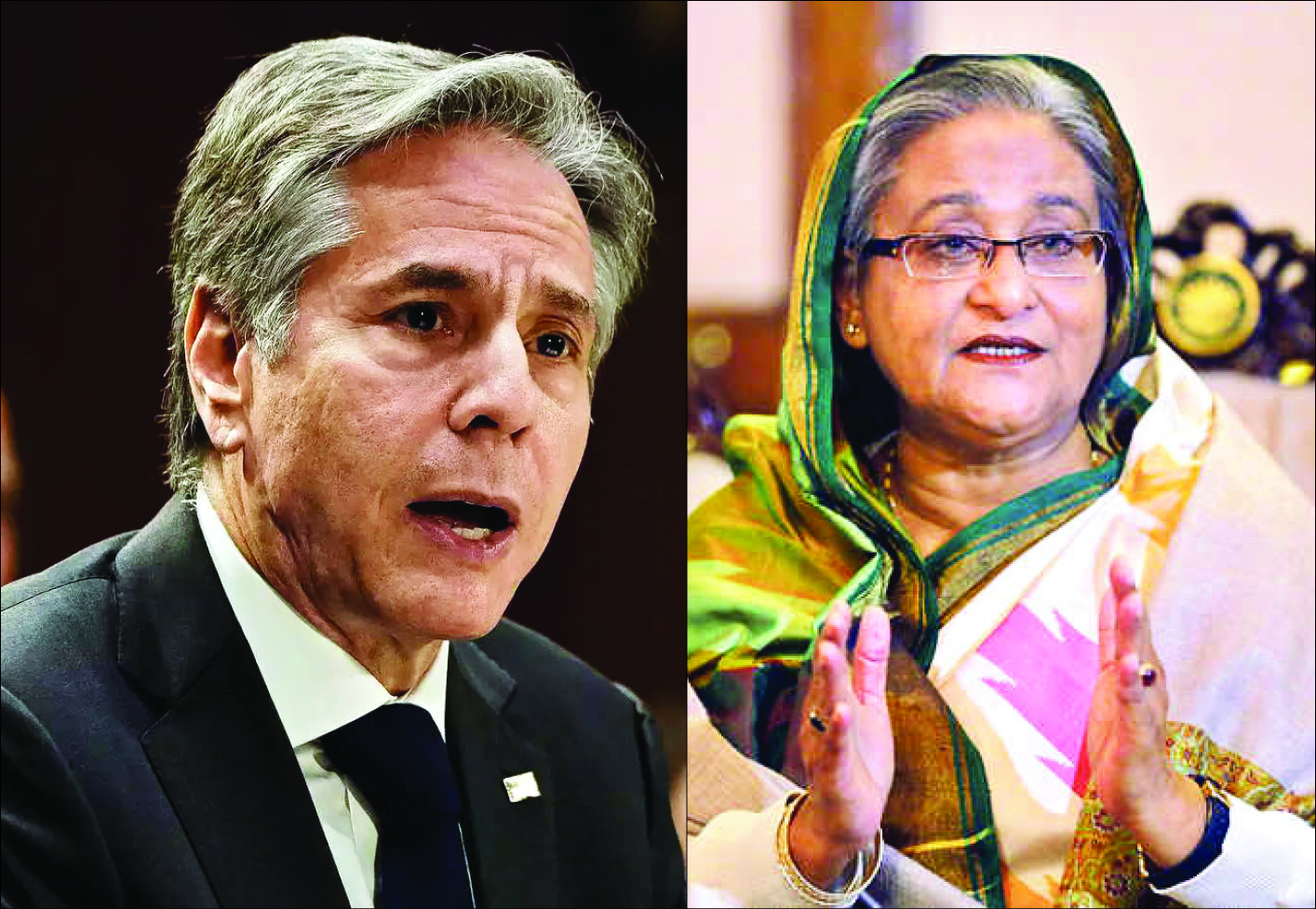Visible faultlines
With the acrimonious exchange between the governments of the US and Bangladesh over America’s new visa policy, bilateral relations between the two nations have hit the nadir

Ahead of the forthcoming parliamentary elections in Bangladesh, the sudden announcement by the US administration imposing sanctions on Bangladeshis seeking visas to the US on May 24 has sparked an ugly row, vitiating bilateral relations between the two countries. This unsavoury development has caused huge ire in Bangladesh's political and social circles, who describe the US decision as a blatant interference in the internal affairs of Bangladesh. Political pundits also reckon that this arbitrary move is reminiscent of the US's brazen meddling in the Cold War period by allegedly toppling governments in South American countries using the notorious CIA.
Prime Minister Sheikh Hasina, who was in the US on April 29 and thought to have received a "warm welcome" from US President Joe Biden, also spoke positively about the prevailing US-BD relations. However, expressing resentment over the recent US decision and calling a spade a spade, Sheikh Hasina unequivocally called upon Bangladeshis to refrain from visiting the US, emphasizing that it was not the only country worth visiting and that there were better oceans to cross and even more beautiful places to be visited. This has set off a trail of acrimonious exchanges between both countries.
As the election heat in Dhaka is currently on, the main political foe, the Bangladesh Nationalist Party (BNP), appears to be upbeat about the US visa decision. The BNP has stepped up its anti-government and anti-Awami League (AL) propaganda to draw maximum political mileage in view of the upcoming elections, which are expected to be full of excitement and possibly suspenseful too. BNP leader Mirza Fakhrul Islam Alamgir recently met the US Ambassador in Dhaka, Peter D. Hass, and described the contents of the meeting as strictly confidential. This has naturally led to widespread speculation, with people starting to believe that the US is clearly supporting the BNP as it does not want the AL to retain power.
It is imperative to note that American support for the BNP is well-known, and the US opposition to the creation of Bangladesh and open support to Pakistan during the 1971 war is equally inscribed in the annals of history and the public domain. The way then-President Richard Nixon and his confidant, Henry Kissinger, displayed American belligerence and flexed their military muscles by sending the US Seventh Fleet to the Indian Ocean is still fresh in the memories of Bangladeshis, even though more than half a century has passed since this failed jingoism. Incidentally, Kissinger, who recently celebrated his hundredth birthday and is believed to be in good health, can safely be termed as a major obstacle in the liberation of Bangladesh and for laying the foundation of US foreign policy that has never shown overt support to Sheikh Mujibur Rahman, his daughter Hasina, or the ruling party, AL.
In light of these realities, Hasina's political wisdom in directly confronting the US at this critical political juncture seems significant. Perhaps, she wants to send signals to the international community that she can defy the might of the US. At the same time, she wants to send a clear message to her political adversaries that she is in charge and will not cave in to any US pressure, particularly in the election environment. She also wants to assure her electorate that her robust leadership can stand up to the US, even if it means the denial of visas to her security agencies and other officials suspected of human rights violations. Additionally, she aims to project herself as someone who can resist any US dictate.
Speaking of US allegations of human rights excesses in Bangladesh, Dhaka has also expressed reservations about the continued acts of racism and consistent human rights infringements within the US. Hasina has even questioned the US for its biased interference in the affairs of other countries solely based on its perception of being a powerful nation. She has also refused to succumb to the US pressure of beating the Bangladesh government into submission for forcing it to hold elections under a neutral, caretaker government.
Reacting to these developments, political analysts and knowledgeable sources believe that the US is using pressure tactics against Bangladesh in an attempt to distance it from any proximity to China and bring it into the "Quad" fold. Some also suspect that the US does not want to maintain the warm relations between India and Bangladesh and has always been supportive of a government led by the BNP and its partner, the Jamaat-e-Islami (JeI), which is now electorally derecognized. Consequently, a significant number of Bangladesh watchers feel that the US may be clandestinely supporting the fugitive BNP leader Tarique Rahman, who is currently in England, by providing various kinds of support to bring back a more compliant party to power. This would enable the US to further its geopolitical and security interests to its advantage.
Amidst these events, the US Embassy in Dhaka is actively engaged in interactions with various individuals. Many Bangladeshis who have business interests in the US are apprehensive about the potential non-availability of visas and how it might adversely affect their commercial enterprises.
Therefore, it appears from the ongoing developments that battle lines have been clearly drawn in Bangladesh's political turf regarding election-related activities. On one side, we have the BNP and Jamaat with perceived support from the US, while on the other side, we have the AL with the backing of liberals and secular factions. It is worth mentioning that the BNP and Jamaat alliance has a significant presence of anti-India, pro-Pakistan, and communal elements. These elements have the potential to disrupt the tranquillity of Bangladesh, especially in the tense and uncertain atmosphere preceding the elections.
The writer is an IPS officer, Adviser NatStrat, security analyst and a former National Security Advisor in Mauritius. Views expressed are personal



